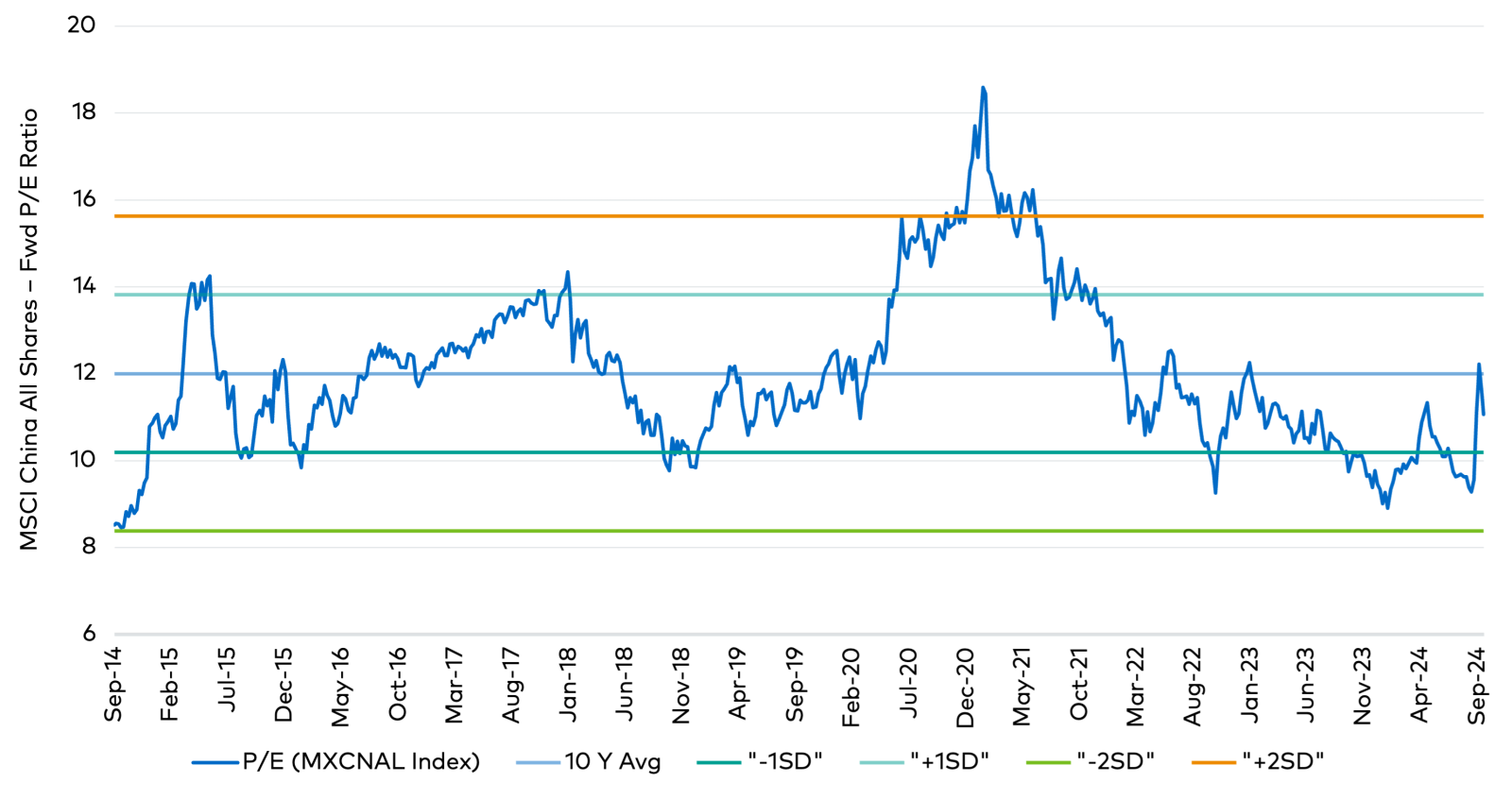Policy Pivot: China at a Crossroads

In September 2024, the Chinese government announced the most comprehensive stimulus package in nearly a decade, aimed at invigorating the Chinese economy and equity markets. China markets responded by posting the biggest single-week gain in almost 16 years, with MSCI China All Shares index rising 16.5%.1 Even the seven-day “Golden Week” holiday in mainland China didn’t stop global investors from piling into the offshore market, with Hong Kong’s Hang Seng Index rallying into the first week of October.2
Polen Capital’s Emerging Markets Growth Team explains why they believe this inflection point for the market is so meaningful, answering the five most pressing questions our clients are asking.
1. What are the measures the Chinese government announced in September 2024?
On September 24, the People’s Bank of China (PBoC) announced an unusually comprehensive set of monetary easing actions, which included cutting the policy interest rate by 20 basis points (bps) and the reserve requirement ratio (RRR) by 50 bps. It also lowered the interest rate on existing mortgages by 50 bps and reduced the required down payment ratio for second homes from 25 percent to 15 percent.3
Moreover, the government provided direct support for the stock market, with a swap line of RMB500 billion (which may be doubled if necessary) for insurers, securities and asset management firms to purchase stock. It also established a re-lending facility of RMB300 billion to listed companies for share buybacks. In an unprecedented display of transparency in forward guidance, the PBoC governor signaled that an additional RRR cut of 25-50 bps is possible by the end of 2024 and that the stock market support package could be increased if needed.
Two days later, the press release from the meeting of the Politburo, headed by President Xi, was striking in both its tone and timing. It communicated a clear sense of urgency to stabilize the property market and boost fiscal spending. It is highly unusual for the Politburo to discuss economic matters in September, a month usually dedicated to party discussions of ideology and discipline.
2. Will these measures work?
In the short term, the announcements certainly energized the “animal spirits” of the stock market. Trading volume surged toward the end of the eventful week, totaling $365 billion for the China complex on Friday the 27th (nearly ten times the average daily volume of the Japanese market) and reaching an all-time high in Hong Kong.4 This dramatic market reaction underscores just how negative China sentiment has been. Investors, both in and outside China, are underinvested in Chinese stocks.5 According to the Bank of America’s fund manager survey, “short China” has been the second most crowded trade after “long Magnificent 7,” year to date.6
Longer term, we believe the true measure of success will be whether the stimulus package can get Chinese households to gain comfort in spending again, and entrepreneurs to feel confident about their businesses. The country’s future prosperity depends largely on the willingness of its people to spend and invest.
3. We’ve seen a few rounds of policy support over the past two years. Why is this time any different?
Based on our team’s long history of observing Chinese government actions, we believe there are three compelling reasons why this round of stimulus is different from what we’ve seen before. In our view, the country’s senior leaders are increasingly:
- Understanding the problem. The new measures indicate consensus that supply-side support is not enough, and fiscal spending is needed to support demand.
- Showing determination to effect change. We observed much bolder messaging in relation to stabilizing property prices and marshaling the necessary resources, whether monetary or fiscal.
- Caring about the stock market. The forceful measures to inject money directly into the stock market are a significant step toward shoring up confidence.
Looking at the latest policy announcements, we believe that the country’s leaders have finally realized, and more importantly, are willing to recognize, what is really ailing China, and why past measures have not worked. Policymakers have started to show a greater sense of urgency about reining in deflation and appear more receptive to alternative policy options.
4. Following this stimulus, what comes next for China? What should investors look for?
In the near term, these coordinated and comprehensive policies could be interpreted as the tolerance level of policymakers in both capital markets and the real economy, setting a “floor” for investor expectations and helping alleviate some of the gloomy concerns that economic growth is no longer a priority in China. Previously, investors had been disappointed by the lack of forceful stimulus, and now hope is reignited for many. The government effectively signaled that economic and capital market matters are important, giving an immediate boost to sentiment.
However, whether the initial rally will lead to a longer-term re-rating of the Chinese stock market is still highly dependent on the fundamental improvement. Stabilizing the property market’s downward spiral, incentivizing consumption and entrepreneurial appetite, and reflating while also containing debt risks are all challenges that will test the government’s resolve and execution. Importantly, it will take time for any material improvements to register in China’s macro data and company earnings.
Our team will be closely monitoring a few areas:
- Further policy announcements, especially on the fiscal side. The National People’s Congress Standing Committee meeting in late October is widely expected to announce a supplementary budget. Some scholars are now calling for a fiscal package of as much as RMB7-10 trillion in the next one to two years to reflate the economy. On the monetary side, an easing U.S. Federal Reserve may offer a more conducive environment for the PBoC to fulfill its promise to conduct significant rate cuts.
- The effects of the stimulus on the real economy. Measures of consumption and property market health should provide insight into whether the stated policy aims are being achieved.
- Corporate earnings and management commentary. These are key indicators for foreign investors with a fundamental focus and long-term investment horizons to regain confidence.
5. How does Polen Capital’s Emerging Markets Growth Team view the market opportunity in China?
The valuation of Chinese equities is still cheap, compared with both historical averages and other markets. After about 16% rally since the stimulus, MSCI China All Shares is currently trading at 11x forward 12-month P/E, which is a) below its own 10-year average of 12x; and b) at 14% discount to the MSCI Emerging Markets Index, while prior to 2023, China used to trade at a premium.7
MSCI China All Shares - Fwd P/E Ratio

Source: Bloomberg, as of September 2024.
As always, we continuously review our portfolio strategy and holdings. With this policy pivot and the significant change in market mood, we believe we are already well positioned. As we see it, the rectification of the previously extreme pessimism—which contributed to the mispricing of the quality companies in which we seek to invest—may deliver attractive returns for our clients.
We search for long-term structural opportunities, seeking to invest in companies with differentiated products and operational excellence. We especially prize businesses that don't rely on government subsidies, skillfully navigate geopolitical tension, and are managed by capable and trustworthy leaders who care about their stakeholders. Many of the businesses we own have demonstrated impressive resilience during downturns and focus on improving shareholder returns. For these reasons, we are optimistic that they may thrive when the macro environment improves.
There will likely be heightened volatility in the market in the near term. After the early stages of the rally, we expect to see more differentiated performance among Chinese companies as time passes and more information becomes available. Accordingly, we think this is an opportune time for investors to pause, reflect, and focus on the fundamentals once again.
Important Disclosures
1Bloomberg, as of October 4, 2024
2Ibid.
3Bloomberg, “China Unleashes Stimulus Package to Revive Economy, Markets,” September 24, 2024
4Ibid.
5Goldman Sachs research, September 2024
6Bank of America, Global Fund Manager Survey, September 2024. “Magnificent 7” refers to a group of influential U.S. stocks: Alphabet, Amazon, Apple, Meta Platforms, Microsoft, NVIDIA, and Tesla.
7Bloomberg, as of October 4, 2024
This information has been prepared by Polen Capital without taking into account individual objectives, financial situations or needs. As such, it is for informational purposes only and is not to be relied on as, legal, tax, business, investment, accounting, or any other advice. Recipients should seek their own independent financial advice. Investing involves inherent risks, and any particular investment is not suitable for all investors; there is always a risk of losing part or all of your invested capital.
No statement herein should be interpreted as an offer to sell or the solicitation of an offer to buy any security (including, but not limited to, any investment vehicle or separate account managed by Polen Capital). This information is not intended for distribution to, or use by, any person or entity in any jurisdiction or country where such distribution or use would be contrary to local law or regulation.
Unless otherwise stated, any statements and/or information contained herein is as of the date represented above, and the receipt of this information at any time thereafter will not create any implication that the information and/or statements are made as of any subsequent date. Certain information contained herein is derived from third parties beyond Polen Capital's control or verification and involves significant elements of subjective judgment and analysis. While efforts have been made to ensure the quality and reliability of the information herein, there may be limitations, inaccuracies, or new developments that could impact the accuracy of such information. Therefore, the information contained herein is not guaranteed to be accurate or timely and does not claim to be complete. Polen Capital reserves the right to supplement or amend this content at any time but has no obligation to provide the recipient with any supplemental, amended, replacement or additional information.
Any statements made by Polen Capital regarding future events or expectations are forward-looking statements and are based on current assumptions and expectations. Such statements involve inherent risks and uncertainties and are not a reliable indicator of future performance. Actual results may differ materially from those expressed or implied.
There is no assurance that any securities discussed herein are currently held in a Polen Capital portfolio nor that they are representative of the entire portfolio in which they are or were held. It should not be assumed that any transactions related to the securities discussed herein were (or will prove to be) profitable or that any future transactions will equal the investment performance of the securities discussed herein.
References to specific securities, asset classes and financial markets are for illustrative purposes only and are not intended to be, and should not be interpreted as, recommendations.
Past performance is not indicative of future results.
This information may not be redistributed and/or reproduced without the prior written permission of Polen Capital.
Forward price-to-earnings (forward P/E) is a stock valuation metric that compares a company’s share price to its projected future earnings.
The MSCI China All Shares Index captures large and mid-cap representation across China A‐shares, B‐shares, H‐shares, Red‐chips, P‐chips and foreign listings (e.g. ADRs). The index aims to reflect the opportunity set of China share classes listed in Hong Kong, Shanghai, Shenzhen and outside of China. The index is maintained by Morgan Stanley Capital International.
The Hang Seng Index ("HSI"), the most widely quoted gauge of the Hong Kong stock market, includes the largest and most liquid stocks listed on the Main Board of the Stock Exchange of Hong Kong. The index is maintained by Hang Seng Indexes Company Limited, a wholly-owned subsidiary of Hang Seng Bank.
20241015-3915395
